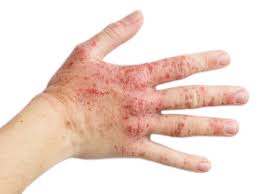- Lichen simplex chronicus

At High-risk
Neurodermatitis develops more frequently in:
- People who have psoriasis, allergic contact dermatitis, or irritant contact dermatitis
- Individuals who have an atopic condition, such as atopic dermatitis, asthma, or hay fever
- Females
- Mid-to-late adulthood, with most cases developing between 30 and 50 years of age
Causes
The exact cause remains unknown
Treatment
The goal of treatment is to stop the itch. What makes treatment so challenging is that the patient must quit scratching, rubbing, and even touching the affected skin. To help the patient and treat the eczema, a dermatologist may prescribe a:
Topical corticosteroid:
A mainstay of treatment, this medication helps reduce inflammation and itch. It is important to apply all corticosteroids as directed to get the full benefit and reduce the risk of side effects.
Topical antibiotic:
When the skin is broken, this helps to prevent infection and to treat a mild infection. Oral antibiotic. This helps clear a skin infection.
Topical keratolytic:
This helps reduce thick skin. A preparation containing urea, salicylic acid, or lactic acid may be used.
Sedative or tranquillizer.
In some cases, this can be helpful in reducing anxiety and help the patient to get restorative sleep.
Occlusion (wrapping the affected skin) may be used to increase the potency of medications and help the patient avoid scratching. In addition to applying medication as directed, dermatologists often recommend that patients:
- Cut their fingernails very short
- Avoid wounding the skin
- Apply ice to the area when it itches instead of scratching
- Avoid common irritants that can cause itch, such as wearing wool or tight fitting synthetic clothing, becoming overheated, and stressful situations
- Follow specific bathing guidelines
Signs and Symptoms
Intensely itchy skin that is usually itchiest when the person is resting or relaxing. Once the skin is scratched, a vicious itch-scratch-itch cycle develops. The more the skin is scratched, rubbed, or even touched, the more it itches. The itch can become so intense that it disrupts sleep. Develops on any area of the body the person can scratch or rub. Most commonly appears on the lower legs, ankles, back and sides of the neck, wrists, forearms, and genitals. Constant itch causes nervous tension (anxiety) in some patients. Often develops on skin previously affected by an outbreak of atopic dermatitis or contact dermatitis (two common types of eczema) or psoriasis.
Scratching can cause:
- Small, well-defined, scaly, reddish plaques.
- Openings in the skin that cause burning pain and leave the patient more susceptible to infection. Signs of infection include open sores, cracks in the skin, and honey-colored crusts.
- Visible scratch marks.
- Over time, constant scratching causes the skin to thicken and darken, and lines in the skin to become more prominent.
- Affected skin may turn pink, red, or reddish brown. When the skin becomes very thick, it sometimes develops a grayish hue.
Risk Factors
The following can irritate the nerves of susceptible people, triggering the intense itch-scratch-itch cycle of neurodermatitis:
- Clothing worn tightly and made of synthetic fabric or wool
- Dry skin
- While uncommon, these may also trigger neurodermatitis
- Exhaust from traffic (long-term exposure)
- Exposure to allergens and skin irritants. For example, some people develop neurodermatitis after using a hair dye that contains P-phenylenediamine (PPD).
- Heat
- Insect bite
- Period of intense stress or emotional trauma
- Poor blood flow
- Scar, especially a keloid-type scar
Duration
- Neurodermatitis remains until it is effectively treated.
- Since effective treatment requires the person to stop scratching, the condition can be a challenge to treat.
- Neurodermatitis can return with exposure to triggers.
How Is It Diagnosed?
Since neurodermatitis may occur along with other common skin conditions, such as other types of eczema and psoriasis, it is best to see a dermatologist for a diagnosis. Effective treatment requires that all skin conditions be accurately diagnosed.
Diagnosis of neurodermatitis involves:
Visual examination of the skin.
Diagnosis also may include:
A skin biopsy: Removing a bit of the affected skin so that it can be examined under a microscope may be necessary. This procedure helps diagnose a skin infection or another skin condition.
Patch testing: This test helps determine what substances cause an allergic reaction in the patient.


